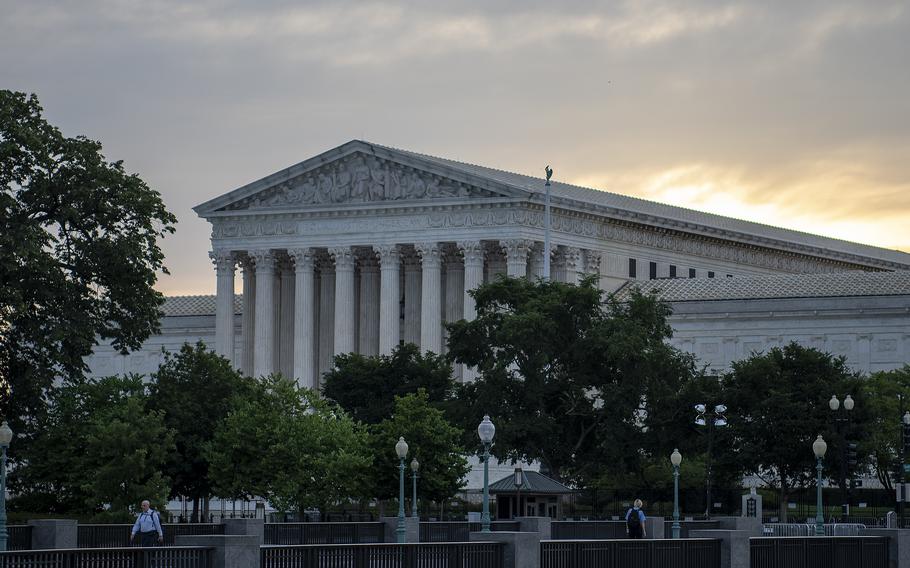
The Supreme Court as seen in Washington, D.C., on July 6, 2022. (Carlos Bongioanni/Stars and Stripes)
WASHINGTON — The Supreme Court disclosed Thursday that it cannot identify the person who leaked a draft of Dobbs v. Jackson Women's Health Organization, the opinion that overturned Roe v. Wade.
A report from the court said "it is not possible to determine the identity of any individual who may have disclosed the document or how the draft opinion ended up with Politico. No one confessed to publicly disclosing the document and none of the available forensic and other evidence provided a basis for identifying any individual as the source of the document."
"While investigators and the Court's IT experts cannot absolutely rule out a hack, the evidence to date reveals no suggestion of improper outside access," the report said.
The legal and political worlds have been anxiously awaiting the results of the Supreme Court's internal investigation since May, after Politico published a draft of the court's opinion. The draft was essentially the same as the decision the court issued weeks later. Five conservative justices used the case to overturn Roe, while Roberts said he would have upheld the restrictive Mississippi abortion law at issue. The court's three liberals combined on an angry dissent.
The leak of Justice Samuel A. Alito Jr.'s draft opinion was an extraordinary breach of the decorum and practice at a place that prides itself on keeping internal deliberations of the justices secret. It has been condemned as a harmful disruption by those members who have discussed it publicly.
Alito said this fall that the leak was a "grave betrayal of trust by somebody, and it was a shock" that led to a "changed" atmosphere at the court and made his colleagues in the majority "targets for assassination." The threat to the justices, he added, was not theoretical because it "gave people a rational reason to think they could prevent that from happening by killing one of us."
Roberts took the extraordinary step of confirming the authenticity of the draft opinion the day after it was published. He also announced an internal investigation into how the draft became public.
"To the extent this betrayal of the confidences of the Court was intended to undermine the integrity of our operations, it will not succeed," Roberts said. "The work of the Court will not be affected in any way."
He has been silent about the leak since then, even as other justices mentioned the investigation was ongoing and talked about what they said were damaging implications of the leak on the court's deliberations and trust among individual justices.
Justice Neil M. Gorsuch said in September it was "terribly important" to identify the source of the leak.
"Improper efforts to influence judicial decision-making, from whatever side, from whomever, are a threat to the judicial decision-making process and inhibit our capacity to communicate with one another," Gorsuch said at the U.S. Court of Appeals for the 10th Circuit's semiannual Bench & Bar Conference in Colorado.
But little is known about the investigation, except for a few reports that have surfaced about disagreements among justices and their clerks over attempts to examine cellphone records.
Conservatives have been increasingly vocal about finding the source of the leak. Meanwhile, abortion-rights protesters have regularly gathered outside the homes of Roberts and other justices since May.
A California man is facing attempted assassination charges after being arrested outside the suburban Maryland home of Justice Brett M. Kavanaugh with weapons and a plan to break into the justice's house.
The leak turned the Supreme Court into a place "where you look over your shoulder," and may have irreparably sundered trust at the institution, Justice Clarence Thomas said at a conference weeks after the leak.
"What happened at the court was tremendously bad," Thomas said. "I wonder how long we're going to have these institutions at the rate we're undermining them. And then I wonder, when they're gone or destabilized, what we're going to have as a country."
Liberal Justice Elena Kagan likewise condemned the leak. "The court depends upon confidentiality in its deliberations in order to reach decisions," she said in an appearance last fall, "and you can't do that if you know that you might wake up tomorrow morning and there is a decision and it is on the front page of newspapers."
The Washington Post's Ann E. Marimow contributed to this report.